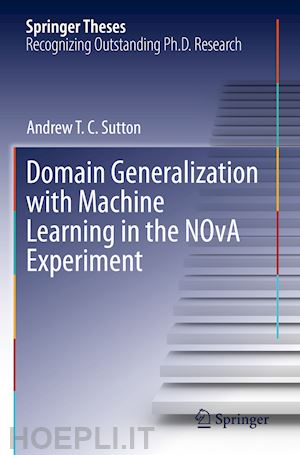

Questo prodotto usufruisce delle SPEDIZIONI GRATIS
selezionando l'opzione Corriere Veloce in fase di ordine.
Pagabile anche con Carta della cultura giovani e del merito, 18App Bonus Cultura e Carta del Docente
This thesis presents significant advances in the use of neural networks to study the properties of neutrinos. Machine learning tools like neural networks (NN) can be used to identify the particle types or determine their energies in detectors such as those used in the NOvA neutrino experiment, which studies changes in a beam of neutrinos as it propagates approximately 800 km through the earth. NOvA relies heavily on simulations of the physics processes and the detector response; these simulations work well, but do not match the real experiment perfectly. Thus, neural networks trained on simulated datasets must include systematic uncertainties that account for possible imperfections in the simulation. This thesis presents the first application in HEP of adversarial domain generalization to a regression neural network. Applying domain generalization to problems with large systematic variations will reduce the impact of uncertainties while avoiding the risk offalsely constraining the phase space. Reducing the impact of systematic uncertainties makes NOvA analysis more robust, and improves the significance of experimental results.
Chapter 1: Neutrinos: A Desperate Remedy.- Chapter 2. A Review of Neutrino Physics.- Chapter 3. The NOvA Experiment.- Chapter 4. Event Reconstruction.- Chapter 5. The 3-Flavor Analysis.- Chapter 6. A Long Short-Term Memory Neural Network.- Chapter 7. Domain Generalization by Adversarial Training.- Chapter 8. Conclusion.
I am an experimental particle physicist focusing on neutrino physics as part of the NOvA and ANNIE experiments located at the Fermi National Accelerator Laboratory (Fermilab) in Batavia Illinois, USA. After graduating cum laude from the University of North Carolina at Charlotte with scientific bachelor degrees in Mechanical Engineering and Physics, I went on to pursue my Ph.D. at the University of Virginia in Charlottesville Virginia. Under the supervision of Craig Group, I studied neutrino physics as a member of the NOvA collaboration. Putting my engineering degree to good use, I received the US Department of Energy Office of Science Graduate Student Research Award to travel to Fermilab and assist in the construction of a Test Beam experiment for NOvA. Alongside the NOvA Test Beam, I also contributed to the main 3-flavor oscillation analysis and was selected as part of the three-person writing committee to draft the paper summarizing our 2020 results (M.A Acero et al. 2022, doi: 10.1103/PhysRevD.106.032004). My graduate education culminated in the machine learning project detailed in this book, which focuses on a technique to train more robust neural networks and reduce the impact of systematic uncertainties that limit the precision of our measurements.











Il sito utilizza cookie ed altri strumenti di tracciamento che raccolgono informazioni dal dispositivo dell’utente. Oltre ai cookie tecnici ed analitici aggregati, strettamente necessari per il funzionamento di questo sito web, previo consenso dell’utente possono essere installati cookie di profilazione e marketing e cookie dei social media. Cliccando su “Accetto tutti i cookie” saranno attivate tutte le categorie di cookie. Per accettare solo deterninate categorie di cookie, cliccare invece su “Impostazioni cookie”. Chiudendo il banner o continuando a navigare saranno installati solo cookie tecnici. Per maggiori dettagli, consultare la Cookie Policy.